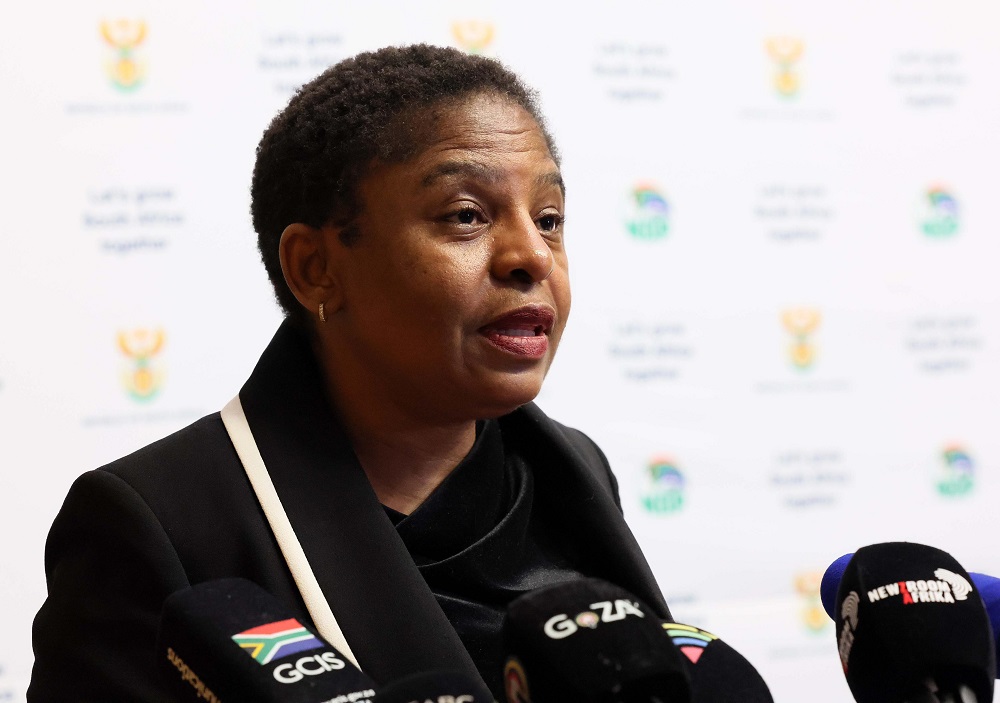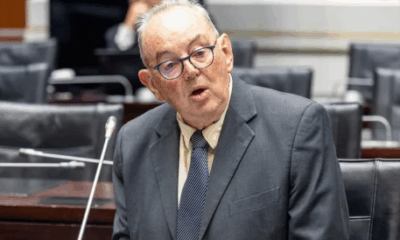News
South Africa Faces Coup d’État Threat, But Intelligence Agencies Are On Guard, Ntshavheni

In a candid briefing that cut through the usual political noise, Minister in the Presidency Khumbudzo Ntshavheni has put the country on alert about a risk many South Africans might find unsettling: the threat of a coup d’état.
But before alarm bells ring too loudly, Ntshavheni was clear. While the threat exists on paper, and intelligence has identified individuals who may be plotting, no active coup attempt has been detected recently. Instead, she assured the public that measures are in place to monitor and mitigate these risks, underscoring South Africa’s commitment to constitutional democracy.
A Historic Step for Transparency in National Security
This revelation came during the rollout of two key documents that offer a rare peek into the country’s security landscape: the National Intelligence Estimate (NIE) and the redacted National Security Strategy (NSS) for the sixth administration (2019–2024).
Ntshavheni called this release “a historic milestone,” marking an important moment in South Africa’s democratic journey, one that blends transparency with the often secretive world of intelligence.
She stressed that while current versions of these intelligence documents remain classified for security reasons, the published versions help citizens understand what threats the State Security Agency is tracking, from illegal migration and cyber threats to climate change impacts and domestic instability.
Coup d’État: A Risk Identified, Not Yet Realised
Among the list of risks identified in the NIE, the possibility of a coup d’état stands out. The idea may sound like a scene from a political thriller, but it’s a reality that intelligence agencies take seriously.
Ntshavheni was quick to add that no recent coup attempts have taken place.
“There has not been anyone attempting to do a coup in South Africa in the last few days or weeks. We say that not because there are no people planning, there are, but we continuously monitor them and deal with those.”
The minister highlighted that while intelligence agencies do the groundwork, law enforcement agencies handle arrests and operational actions, emphasizing the coordination needed between intelligence and security forces.
Intelligence and Security in a Complex World
The documents show that South Africa’s national security landscape is broad and complex. Threats extend far beyond traditional political risks.
The NIE paints a picture of a nation grappling with transnational organised crime, terror financing, economic sabotage, and the impacts of climate change, which Ntshavheni notes is an “exceptional” ongoing crisis demanding attention.
Her remarks underscore the country’s strategic aim to be proactive rather than reactive, stressing the goal of preventing crises before they erupt.
“We should not be measured by the number of crises we managed but by the number of crises that did not take place.”
Building a Modern, Ethical Intelligence Service
Behind these words lies a broader ambition. Ntshavheni framed the release of the NIE and NSS as part of a commitment to transform South Africa’s intelligence sector into a modern, professional body that serves the Constitution and the public, not partisan interests.
She spoke of the intelligence community’s role in protecting human security, which, for South Africa, means economic stability, democratic governance, and social justice.
“Our national security response must be anticipatory, inclusive, and adaptive.”
What South Africans Need to Know
This transparency around national security risks comes at a time when trust in institutions and political stability are under constant strain.
South Africans can take comfort in knowing their security agencies are alert to hidden dangers, including the high-stakes threat of a coup. But it also invites deeper public conversations about governance, vigilance, and the resilience of democracy.
Social media reactions have ranged from appreciation for the openness to concerns about political tensions simmering beneath the surface. Many voices on Twitter and Facebook echoed the sentiment that vigilance is critical but must be balanced with upholding democratic freedoms.
Keeping Democracy Safe
As South Africa continues navigating complex domestic and global challenges, Ntshavheni’s message is clear: security isn’t about managing chaos after it hits, but about foresight and prevention.
The release of these intelligence documents invites all South Africans into a crucial dialogue about safeguarding the nation, not just from coups, but from all threats that could undermine the hard-won democracy.
In a country with a vibrant but sometimes fractious political landscape, it’s a reminder that the future depends on a collective commitment to transparency, accountability, and unity.
If the past years have taught South Africans anything, it’s that vigilance and resilience go hand in hand. With eyes on the risks and minds focused on solutions, the nation can aim to weather any storm, coup plots included.
{Source: IOL}
Follow Joburg ETC on Facebook, Twitter , TikTok and Instagram
For more News in Johannesburg, visit joburgetc.com



























